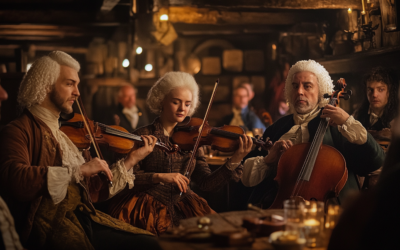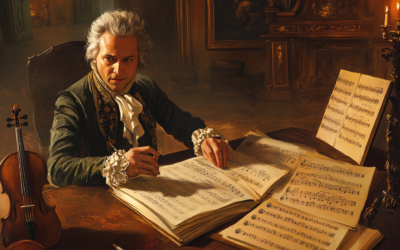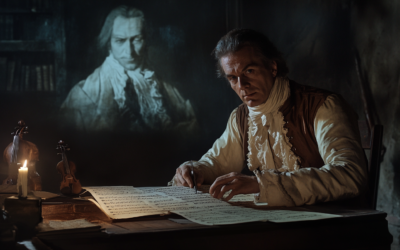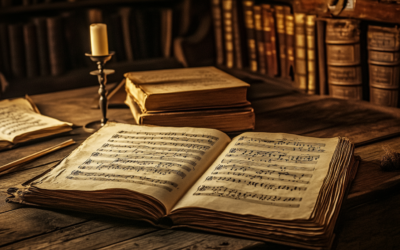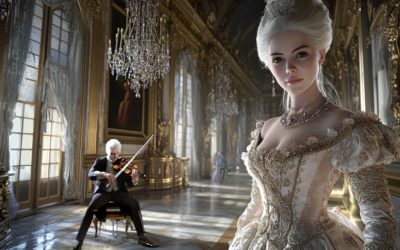A Revolutionary Encounter at Cremona Musica
Presenting Mozart: The Fall of the Gods at the World’s Most Prestigious Music Fair
We’re honored to have taken part in the remarkable atmosphere of Cremona Musica, a festival renowned worldwide for bringing together the finest names in music and lutherie. It’s here, at this grand fair, that we presented our latest work, Mozart: The Fall of the Gods. This book is the culmination of our research into Mozart’s true legacy, seeking to unravel the myth and bring clarity to his legacy with documented sources and in-depth analysis.
Mozart: The Fall of the Gods
This book offers a fresh and critical look at the life of Wolfgang Amadeus Mozart, challenging the myths that have surrounded him for centuries. We strip away the romanticised image of the “natural genius” and delve into the contradictions within Mozart’s extensive biographies. Backed by nearly 2,000 meticulously sourced citations, this work invites readers to explore a deeper, more complex understanding of Mozart. Perfect for those who wish to question the traditional narrative, this biography is a must-read for serious music lovers and historians.
"Cremona Musica: a global fairground where excellence meets exchange, and every voice is invited to the conversation."
@MozartrazoM
We’re honored to have taken part in the remarkable atmosphere of Cremona Musica, the world’s leading music fair and a global hub for musicians, luthiers, and music enthusiasts. Recognized as the premier international gathering for fine instruments and music professionals, Cremona Musica represents the pinnacle of musical excellence and innovation. To be invited to present at this prestigious event is a source of great pride for us, and we are grateful for the opportunity.
Our presentation of Mozart: The Fall of the Gods – Part Two was met with an exceptional response. Engaging with a diverse audience, we shared insights from our work and encouraged open discussion. This fair offers more than an exhibition space; it’s a unique arena for the respectful exchange of ideas and in-depth dialogue that pushes the boundaries of conventional musical scholarship.

Our second conference at Cremona Musica focused on the fascinating legacy of the Neapolitan school, specifically the study of partimenti, a unique pedagogical tool that influenced generations of composers. Alongside internationally acclaimed guitarist and soloist Maestro Edoardo Catemario, we explored the rich heritage of these musical exercises, illustrating their importance with select examples. The Maestro’s expertise brought new depth to our discussion, capturing the enduring relevance of the Neapolitan method and its influence on classical music.
Cremona Musica’s world-renowned reputation is built not only on its unmatched gathering of instruments and exhibitors but also on its high-quality events, featuring over two hundred performances, conferences, and masterclasses each year. For us, this fair was not merely a showcase but a milestone moment of dialogue and mutual enrichment. We extend our gratitude to the organizers, our fellow presenters, and the vibrant audience that made this year’s event truly memorable.
You May Also Like
Mozart’s Quartet of Lodi: A Dated Work with Many Influences
Mozart’s Quartet of Lodi is often praised as an early masterpiece. But was it really his own work?
The Hidden Influence of Joseph Boulogne, Chevalier de Saint-George
Joseph Boulogne, known as the “Black Mozart”, was shaping the future of music while Mozart was still struggling for recognition in Paris. But history has buried the significant influence Saint-George had on Mozart’s career, erasing his pioneering style from the narrative.
Mozart’s Violin Pieces: Substitutes for Failed Movements?
Despite revisions, Mozart’s violin concertos remain flawed, while his minor pieces, K.261 and K.373, surprisingly garner more attention in his correspondence than his major works.
The Questionable Origins of Mozart’s Violin Concertos
Are Mozart’s violin concertos truly original? This article explores the possibility that the Czech composer Josef Mysliveček played a far larger role in their creation than previously acknowledged.
The Kolb Concerto: A Mozartian Mirage?
The Kolb Concerto’s dubious origin and poor musical quality expose yet another myth in the Mozartian canon. If this is the work of a genius, then perhaps we’ve been fooled for centuries.
The Adélaïde Deception: Mozart’s “Lost” Violin Concerto and the Art of Musical Forgery
In the early 20th century, the “discovery” of Mozart’s sixth violin concerto in Paris created a sensation. Dubbed the Adélaïde Concerto and supposedly written for Madame Adélaïde of France, it was hailed as a testament to Mozart’s genius. However, as the story unfolds, it becomes clear that this masterpiece was not the work of the child prodigy but rather a carefully orchestrated hoax by Marius Casadesus. Despite its unmasking as a forgery, the concerto continues to captivate audiences, raising questions about authenticity and the music industry’s willingness to deceive for profit.


